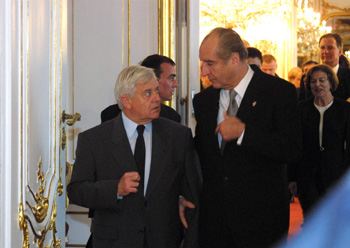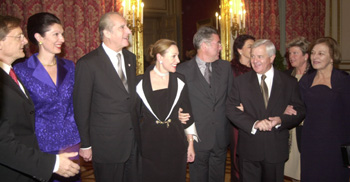|

SLOVENIA AND AUSTRIA KNOW EACH OTHER WELL
First official visit by the President Milan Kucan to Austria
Statement of the President of the Republic of Slovenia Milan Kucan after the talks with Federal President of the Republic of Austria
Vienna (Austria), 6 November 2001
On the first day of his official visit to the Republic of Austria President Kucan met with his host President Thomas Klestil, the Speaker of the Austrian Parliament, Dr Heinz Fischer, and the Austrian Federal Chancellor, Dr Wolfgang Schuessel. The discussions focused primarily on bilateral relations, EU enlargement, the status of the Slovenian minority in Austria and current world affairs. On the second day of his visit President Kucan was called on by the Austrian Minister of Foreign Affairs, Dr Benita Ferrero-Waldner, and the Minister of Economic Affairs and Labour, Dr Martin Bartenstein.
Mr. Kucan also met the President of the Constitutional Court, Dr Ludwig Adamowich, discussing the relationship between national and EU law and the experience of the Austrian Constitutional Court in regulating this relationship. President Kucan also received the leader of the Social-Democratic Party, Dr Alfred Gusenbauer, the Chairman of the Austrian-Slovenian Friendship Society, Dr Caspar Einem, visited the Korotan Slovenian culture centre, Vienna City Hall, where he met with the Mayor of Vienna, Dr Mihael Haupl, and attended a concert by the Musica Danubiana orchestra performed by the Symphony Orcestra of Radio - Television Slovenia.
President Kucan was the keynote speaker at the Austrian-Slovenian business conference "Slovenia and Austria: Partners and Neighbours in the Future EU".
 Ladies and Gentlemen, Ladies and Gentlemen,
I came to Vienna to affirm and strengthen good, friendly and productive relations that have developed between Austria and Slovenia. The credit for these good relations must also go to President Klestil.
Productive relations have also developed as a result of dialogue between our governments this year and enable us to direct our attention to matters which are today in our common interest and will be tomorrow in the common interest of Slovenia and Austria on the wider Central European and European levels. In the ten years since the creation of the Slovenian state, Austria and Slovenia have walked a common path long enough to get to know each other well. The understanding and support provided to Slovenia by Austria since the very beginning, and for which we are grateful, facilitated the solving of a number of problems for Slovenia such as being recognised by the world and joining the process of European and international integration.
However, it is true that there are some problems which could easily be solved if Ljubljana as well as Vienna would try to influence the finding of a solution as consistently as they try to influence good relations and if the relations between the countries were more productive.
It is not a secret that Slovenia's current priority is to join the European Union and NATO. The latter does not directly concern Austria. President Klestil again congratulated me on Slovenia's successful progress towards accession to the European Union. But it is also true that an intensified dialogue between Vienna and Ljubljana would enable Slovenia to close some chapters. Nevertheless, I am convinced that in relations between Austria and Slovenia the time has come to launch a debate on common responsibility for peace, security and prosperity in Europe.
 The President has mentioned that we discussed the problems of a globalised world. My visit is taking place in different circumstances than at the time when we planned it. The terrorist attacks in the USA have forced us to see the world as it is and not as we would like it to be. It demonstrated the high level of interdependence in this world and the considerable joint responsibility. The question how to govern this world remains and whether it is possible to govern it without introducing global responsibility. We agreed that global dialogue on these issues must be initiated a dialogue focusing on the common points of civilisations. Europe must participate in this dialogue. And in order to do so it must first arrange an internal European dialogue. The President has mentioned that we discussed the problems of a globalised world. My visit is taking place in different circumstances than at the time when we planned it. The terrorist attacks in the USA have forced us to see the world as it is and not as we would like it to be. It demonstrated the high level of interdependence in this world and the considerable joint responsibility. The question how to govern this world remains and whether it is possible to govern it without introducing global responsibility. We agreed that global dialogue on these issues must be initiated a dialogue focusing on the common points of civilisations. Europe must participate in this dialogue. And in order to do so it must first arrange an internal European dialogue.
We must strive to establish conditions in which we will first of all speak as Europeans and not as the English, Germans, French, Italians, Austrians and Slovenians ... Therefore I see a dialogue between Slovenia and Austria as an integral part of this inter-European dialogue. In our visions for the future the time has come when we can leave the past to the historians. We have a common history. We created this history together. We created each other's histories. Now I think we have added to it. The establishment of a Slovenian-Austrian commission of historians is in my opinion positive. It is left to politics to redress the wrongs individual wrongs where these were afflicted.
It is in this perspective that I see the problem of minorities. I see them as an advantage, as a treasure that Europe will have to look forward to. Finally, Europe as an entire multicultural community must be aware of this. With respect to the Slovenian minority in Austria and German speaking citizens in Slovenia the President and I have long held the view that positive discrimination is essential to equality between minorities. In the light of this, Slovenia supports the ratification of a cultural agreement. As to the position of the Slovenian minority in Austria, its assessments are important.
We also discussed the situation in south-eastern Europe, in the Balkans. We both believe that this is a European problem and above all a Slovenian problem due to its proximity. We believe that it is possible to stabilize this part of Europe for the long-term through joint initiatives, particularly by opening the European prospects to the Balkans.
ORF - question: Mr President, to what extent do you feel the support of Austria in your process to join the European Union? Particularly in terms of transport where Austria could become a stumbling block.
Milan Kucan: Slovenia's interests in transport policy are identical to Austria's interests since all roads from Austria to the south-east cross Slovenia. We understand that Vienna would like to discuss transport policy within the EU. However, it is our wish that Austria would find another way which would not halt Slovenian negotiations on the transport chapter with the European Commission. If Austria accelerates Slovenia's accession to the EU there will be two countries in the EU interested in discussing transport within the EU. It is indeed a two way street but with some narrower sections where lay-bys are needed to avoid collision.
Question: President Kučan you said that history should be left to historians while it is the task of politics to address issues involving individual wrongs. Could you give us an example or two to illustrate this?
Milan Kucan: I can give you two. I assume you were referring to the AVNOJ decisions of 1944. These decisions are not based on collective guilt but on membership of national socialist organisations. If there is a possibility that somebody was wronged then, Slovenia is prepared to redress the wrong.
The second example is the payment of compensation to forced labourers. Austria is paying compensation to those who can prove that they were forced to work in Austria during that period.

|





